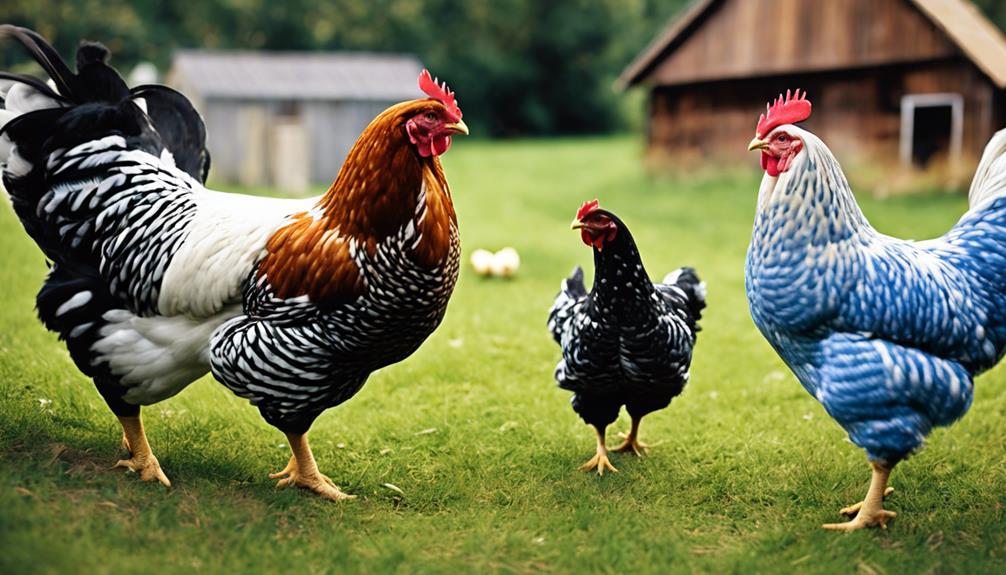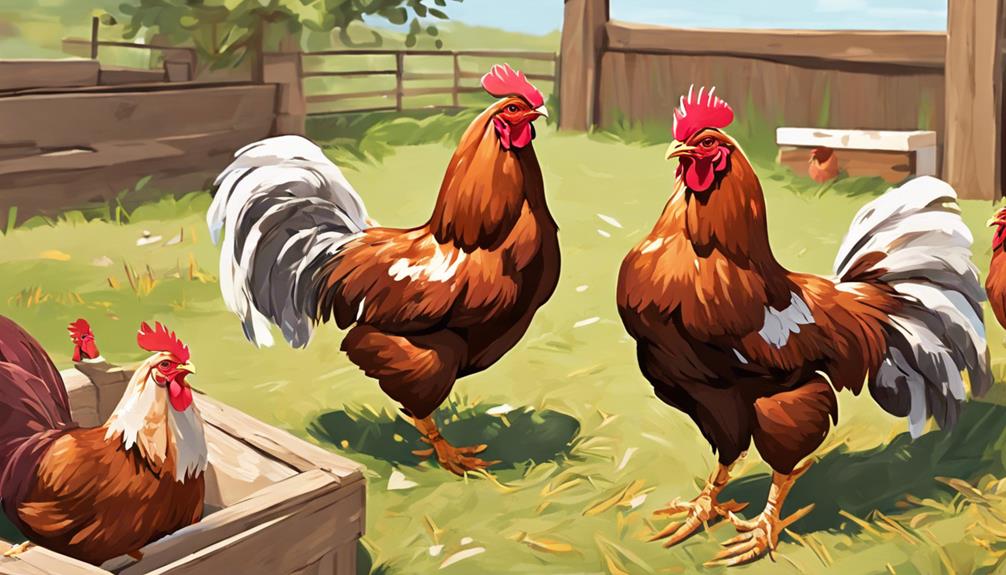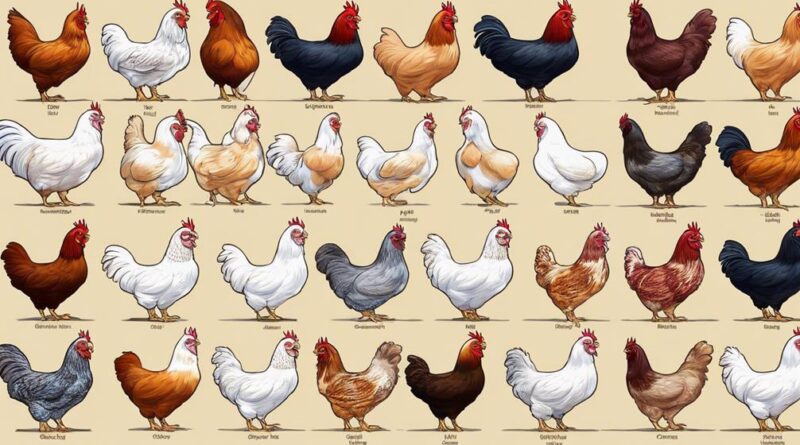10 Best Chicken Breeds for Optimal Egg Production"
When it comes to maximizing egg production, selecting the right chicken breed is crucial. Imagine having a flock that consistently provides you with a steady supply of fresh, flavorful eggs. It all starts with choosing the most suitable breeds that align with your production goals and preferences. Each of the top 10 chicken breeds highlighted brings unique qualities to the table, ensuring a diverse range of options to cater to various needs. So, which of these breeds will ultimately prove to be the ideal choice for your egg-laying endeavors?
Rhode Island Red
When selecting a chicken breed for high egg production, consider the Rhode Island Red for its efficiency and reliability. The Rhode Island Red is renowned for its exceptional egg-laying capabilities, making it a top choice for poultry enthusiasts. This breed typically produces large brown eggs, known for their rich flavor and quality. The eggs laid by Rhode Island Reds aren't only delicious but also aesthetically pleasing due to their earthy brown coloration.
Apart from being excellent layers, Rhode Island Reds are also valued for their dual-purpose nature. In addition to their egg-laying abilities, they're appreciated for their quality meat production. This dual-purpose trait makes them a practical choice for those looking to maximize the utility of their flock.
Furthermore, Rhode Island Reds exhibit a calm and friendly temperament, making them easy to handle and suitable for backyard settings. Their docile nature also makes them ideal for families or beginners in poultry keeping.
Leghorn
Known for their exceptional egg production rates and distinctive appearance, Leghorns are a popular choice among poultry farmers and enthusiasts alike. Leghorns are a breed of chicken that excels in laying large white eggs consistently throughout the year. Here are some key characteristics and egg production capabilities of Leghorns:
- Breed Characteristics:
- Leghorns are known for their active and alert nature.
- They've a slender body with a prominent upright tail.
- These chickens come in different color varieties such as white, brown, and black.
- Leghorns have large combs and wattles.
- They're excellent foragers and do well in free-range environments.
When it comes to egg production capabilities, Leghorns truly shine:
- Egg Production:
- Leghorns are one of the best egg-laying breeds, known to lay around 280–320 large white eggs per year.
- They start laying eggs at a young age, typically around 4-5 months old.
- Leghorn eggs are known for their strong shells and high-quality yolks.
- They've a consistent laying pattern throughout the year, making them reliable layers for commercial egg production.
- Leghorns are efficient converters of feed into eggs, making them a cost-effective choice for egg production operations.
Sussex
Sussex chickens, characterized by their dual-purpose qualities, are a versatile breed highly regarded for their robustness and productivity in both egg laying and meat production. Sussex chickens are known for their distinctive black and white plumage, which gives them a striking appearance. They're medium to large-sized birds with a broad, deep body and a moderately low stance.
In terms of Sussex characteristics, these chickens are docile and friendly, making them a great addition to backyard flocks. They're excellent foragers and do well when given access to free-range environments. Sussex chickens are hardy and can adapt to various climates, making them suitable for different regions.
When it comes to Sussex egg size, they typically lay large to extra-large brown eggs. These eggs are known for their rich flavor and strong shells. Sussex hens are consistent layers, providing a steady supply of eggs throughout the year. The large size of Sussex eggs makes them a popular choice among egg consumers.
Plymouth Rock
Plymouth Rock chickens, like Sussex, are a dual-purpose breed highly valued for their productivity in both egg laying and meat production. When considering Plymouth Rock chickens for egg production, there are specific characteristics and qualities that make them stand out:
- Plymouth Rock: Color Varieties
- Plymouth Rock chickens come in various color varieties, including Barred, White, Buff, Silver Penciled, Partridge, and Blue. This variety allows for personal preference in appearance while maintaining high productivity levels.
- Plymouth Rock: Dual Purpose Qualities
- Known for their excellent egg-laying capabilities, Plymouth Rock hens have the potential to produce around 200-280 large brown eggs per year. This consistent egg production makes them a practical choice for those focusing on egg yields.
- Docile Nature
- Plymouth Rock chickens are known for their friendly and docile temperament, making them easy to handle and suitable for backyard settings. Their calm demeanor also reduces stress levels, which can positively impact egg production.
- Adaptability
- These chickens are adaptable to various climates and environments, allowing them to thrive in different conditions. Their hardiness makes them a reliable choice for egg production in diverse settings.
- Meat Quality
- While excelling in egg production, Plymouth Rock chickens also offer high-quality meat, making them a valuable dual-purpose breed for those interested in both eggs and meat.
Australorp
Australorp chickens, recognized for their exceptional egg-laying abilities, are a prominent breed in the poultry industry. When focusing on Australorp breeding techniques, it's essential to consider their genetic makeup. Selective breeding plays a crucial role in enhancing the breed's egg production capabilities. Breeders often prioritize Australorps with a strong genetic predisposition for prolific egg-laying, ensuring that desirable traits are passed down through generations. This meticulous breeding process contributes to the overall success of Australorps as top egg producers.
In terms of Australorp egg quality characteristics, these chickens are known for laying large brown eggs consistently. The quality of the eggs is a result of the breed's ability to efficiently convert feed into high-quality protein for egg production. Australorps also exhibit strong shell quality, which is essential for protecting the egg during handling and transportation. Additionally, the rich yolk color of Australorp eggs is a testament to their nutritional value. When compared to other breeds, Australorps are renowned for their ability to maintain egg size and quality throughout their laying cycle.
Orpington
One of the notable characteristics of the Orpington breed is its versatility in both egg production and meat quality. Orpington chickens are known for their calm and friendly temperament, making them a great addition to any backyard flock. When it comes to egg production, Orpingtons are reliable layers of large brown eggs, making them a popular choice among poultry keepers. The rich color of their eggs adds a beautiful touch to your daily egg collection.
Orpington Breed Characteristics:
- Orpington Egg Color: Orpingtons typically lay large brown eggs, which aren't only aesthetically pleasing but also nutritious and delicious.
- Orpington Temperament: These chickens are known for their docile and friendly nature, making them great pets for families with children or beginners in poultry keeping.
- Dual-Purpose Birds: Orpingtons are valued for not only their egg-laying abilities but also for their quality meat, making them a practical choice for homesteaders.
- Cold Hardy: With their fluffy feathers and sturdy build, Orpingtons are well-suited to colder climates, thriving even in chilly conditions.
- Broodiness: Orpington hens are known to occasionally go broody, which can be advantageous if you're interested in hatching your own chicks or expanding your flock naturally.
Wyandotte

The Wyandotte breed of chicken is renowned for its striking plumage and robust dual-purpose qualities. When it comes to Wyandotte care, these chickens are relatively easy to care for. They're cold hardy and do well in various climates, making them a popular choice for backyard chicken enthusiasts. Wyandottes also have a docile temperament, making them friendly and easy to handle.
One notable aspect of Wyandottes is their broody behavior. They've a tendency to go broody, which means they may try to hatch eggs. While this can be advantageous if you want to hatch chicks naturally, it can also affect their egg-laying productivity. If you're looking for consistent egg production, you may need to manage their broodiness carefully.
In terms of Wyandotte egg color, these chickens typically lay brown eggs. The egg production of Wyandottes is respectable, with hens laying consistently throughout the year. Their eggs are of good size and have a rich flavor.
Marans
Known for their distinctive dark eggs, Marans chickens are a popular choice for egg production due to their unique characteristics and qualities. Marans egg coloration is one of the key features that attract many poultry keepers. The deep, chocolate-brown eggs these chickens lay add a touch of elegance to any egg basket.
Apart from their egg color, Marans also exhibit specific temperament traits that make them desirable for egg production:
- Gentle Nature: Marans are known for their calm and docile demeanor, making them easy to handle and suitable for beginners.
- Hardy Birds: These chickens are robust and can adapt well to varying environmental conditions, making them resilient layers.
- Good Foragers: Marans have a natural instinct for foraging, which can help reduce feed costs while providing them with a varied diet.
- Winter Layers: With their cold-hardy nature, Marans continue to lay eggs consistently even during the winter months, ensuring a year-round egg supply.
- Low Maintenance: Due to their independent nature and good health, Marans require minimal upkeep, making them a convenient choice for egg production enthusiasts.
ISA Brown

Highly regarded for their exceptional egg-laying capabilities, ISA Brown chickens are a favored choice among poultry farmers seeking reliable and prolific layers. When considering the health benefits of ISA Browns, their robust nature and resistance to diseases make them a valuable asset to any flock. These chickens are known for their adaptability to various climates, resulting in consistent egg production throughout the year, including winter months.
ISA Browns possess a unique genetic makeup that contributes to their overall health and productivity. Their ability to lay a large number of eggs while maintaining good health is a significant advantage for farmers looking to maximize production. Additionally, ISA Browns have a docile temperament, making them easy to handle and manage, further adding to their appeal for both small-scale and commercial egg producers.
During winter, when many chicken breeds experience a decline in egg production due to decreased daylight hours and colder temperatures, ISA Browns continue to lay eggs consistently. Their efficient feed conversion rate and resilience to cold weather conditions enable them to sustain egg production levels even in less favorable environmental circumstances.
Ameraucana
Ameraucana chickens, known for their distinctive blue eggs, are a popular choice for backyard egg production due to their unique appearance and reliable laying capabilities. These chickens are a delight to have in your flock, offering not only beautiful eggs but also a friendly and docile demeanor.
- Ameraucana Egg Colors:
Ameraucana chickens lay eggs in various colors, including blue, green, and even pinkish hues. This color range adds an aesthetic appeal to your egg basket.
- Ameraucana Egg Size:
Ameraucana eggs are typically medium-sized, making them suitable for various culinary uses. Their consistent size is advantageous for both cooking and selling purposes.
- Distinctive Appearance:
Ameraucanas are known for their fluffy cheeks, muffs, and beards, giving them a charming and distinctive look that sets them apart from other breeds.
- Laying Frequency:
Ameraucanas are moderate to good layers, producing around 3-4 eggs per week on average. This consistent laying pattern ensures a steady supply of fresh eggs for your household.
- Adaptability:
Ameraucanas are hardy birds that can adapt well to different climates, making them suitable for backyard setups in various regions. Their ability to thrive in diverse conditions makes them a practical choice for many chicken keepers.
Frequently Asked Questions
Can These Chicken Breeds Be Raised in Urban Settings?
In urban settings, raising these chicken breeds may present challenges due to space constraints and noise regulations. Zoning restrictions might limit the number of chickens you can keep or the type of coop you can have.
Urban environments require careful planning to ensure compliance with local laws and ordinances. Consider the specific regulations in your area before embarking on raising these chicken breeds to avoid any legal issues or neighborhood disturbances.
Do These Breeds Require Special Dietary Supplements for Optimal Egg Production?
To optimize egg production, certain chicken breeds may benefit from dietary supplements. Supplements can enhance eggshell quality and support overall health, leading to better egg output.
When planning feeding schedules, consider adding calcium-rich supplements for stronger shells and protein supplements for improved egg production.
Monitoring and adjusting dietary intake can help ensure that your chickens receive the necessary nutrients for optimal egg laying.
Are There Any Specific Health Concerns Associated With These Breeds?
When considering specific health concerns associated with chicken breeds, it's crucial to focus on breeding practices and genetics. Different breeds may be prone to certain hereditary issues or vulnerabilities.
Additionally, environmental factors and housing conditions play a significant role in maintaining the well-being of the chickens. By carefully monitoring these aspects, you can help mitigate potential health risks and ensure the overall health and productivity of your flock.
How Do These Breeds Perform in Extreme Weather Conditions?
In extreme weather conditions, some chicken breeds excel. Winter survival is crucial, and cold-hardy breeds like Rhode Island Reds and Barred Plymouth Rocks fare well. They've thick feathers and adapt to lower temperatures.
Conversely, in summer heat, breeds like Leghorns and Sussex display good heat tolerance. Lighter feathering and heat-adapted genetics help them cope with high temperatures.
Consider these traits when choosing breeds for varying weather conditions.
What Are the Average Lifespans of These Chicken Breeds?
When considering the average lifespans of chicken breeds, variations exist due to genetic factors. Environmental conditions also play a crucial role.
Lifespan can impact productivity, as longer-living hens have more time to lay eggs. Some breeds, like Leghorns, generally live around 4-6 years, while others, such as Rhode Island Reds, may live 6-8 years.
Selecting breeds with longer lifespans can positively influence egg production over time.
Conclusion
In conclusion, the selection of the Rhode Island Red, Leghorn, Sussex, Plymouth Rock, Australorp, Wyandotte, Marans, ISA Brown, and Ameraucana chicken breeds for egg production is based on their exceptional egg-laying abilities, efficiency in feed conversion, adaptability to various climates, and dual-purpose nature.
These breeds exhibit robustness, consistent egg production, and friendly temperaments, making them ideal choices for both backyard and commercial egg production operations.
Choose wisely to ensure optimal egg production in your flock.
